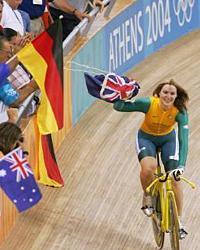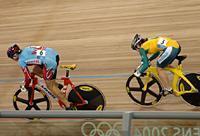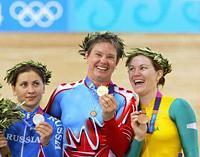
Recently on Cyclingnews.com |
An interview with Anna Meares, November 6, 2004
A household name in under 34 seconds
Part I: Little sister big sister, the Sprint, facing the media, front or behind, a popularity contest

|
Anna Meares became a household name in less than 34 seconds in August this year.
Until her world record-breaking ride to win the gold medal in the 500m time trial at the Athens Olympics, the 20 year-old had already made a big impression on the cycling scene. As the world champion in the 500m time trial, Anna Meares knew the pressure to perform in Athens would be on.
Together with her coach Martin Barras, she prepared for the prospect of being the last Rider to start this two lap effort. 'Last Ride at the Olympics; 34.1 on the board.' That was the motto in training... and that's exactly what transpired!
Due to space limitations, the full transcript of this two-part interview was not able to be published in the latest issue of Ride Cycling Review, which interviewer and publishing editor Rob Arnold allowed us to use in full below.
Rob Arnold, Ride Cycling Review: How's life going to be now that you're an Olympic champion?
Anna Meares: I hope it's not too different. Everyone has told me that life is never going to be the same, but I still feel like me. I'm still Anna, still the girl that likes to do other things in her life but likes to do cycling as well.
I feel like I've just achieved something that I've been dreaming of for a long time and I hope that I'm still able to relax and spend time with my friends and my family.
I think it'll change professionally for sure. But on a personal level I don't think my life will change too much. I hope it doesn't because I was liking it the way it was. But a change is always good, so long as it's for a better cause.
Ride: Your sister Kerrie was always touted as the Meares that would come forward and dominate the world of sprint cycling and now you're doing it. Was it good to have Kerrie there to take that pressure off you early in your career?
AM: Yeah. right up through the juniors and into the seniors still, Kerrie was very much the one who took all the media pressure. I think it was great because she sheltered me a lot from it and I was able to relax and calm myself down and enjoy cycling for the fact that I like to do cycling.
"My head cracked under the pressure of possibly winning the second gold medal. That's the first time I've ever experienced that. "- August 24: The Women's Sprint Semi-Finals |
Once Kerrie stepped out of the picture the focus turned more towards me and I wasn't really ready for the amount of media that I've received. But I've had a great time and Kerrie has really helped me through it. Yeah, I was in Kerrie's shadow for a while but it certainly wasn't much of a hindrance. It was in some areas but I wasn't good enough to be in the limelight at that stage. I knew my time would come and when it came, it was very dramatic.
I'm happy for the limelight that Kerrie has had and I'm looking forward to sharing it with her. The Commonwealth Games (in Melbourne in 2006) and the Olympics in Beijing are going to be unbelievable. The competition not only between us two but what we can possibly take to everyone else in the world.
Ride: Her injuries have essentially passed?
AM: No, they're still there but she is back on the bike and in the gym and doing stuff that she hasn't been able to do for a while. But she's got to be able to take her time and be patient with it. If she pushes herself too much in training then she'll be sore for the next couple of days and have to take some time off. If she takes it all in her stride rather than trying to rush I think she'll be back on form in the next couple of years.
She wants to be on form for the worlds in LA. I think that's going to be a difficult task but she's a determined girl and if anyone says 'no, you can't do it', then she'll go out and try and do it. I just hope that she keeps in mind the fact that she's in it for the long haul not just a short run.
Ride: We'll talk about the sprint races at the Olympics first. You have mentioned that you don't like to talk to people in the lead-up to a time trial but I would imagine that you'd have more to think about when you're racing against Lori-Anne [Muenzer] - she's an impressive competitor.

|
AM: Yeah, she's a lovely lady and I have a lot of time for her both personally and professionally. The difficult thing for me with the sprint was, after the time trial I faced a lot of media. They're very, very clever at planting little seeds in your head. And instead of asking me questions like who I thought my opponents might be in the sprint, what tactics I might be using, that sort of stuff, the questions were: 'So, you're going for your second gold medal' and they were putting the pressure on for a second gold.
I just said to them, 'Yeah, I'm in another event and I want to win it, but there are 10 or 15 races before I get to the gold medal race off.'
But even in between the sessions - round one, quarter-finals and semi-finals - I had a chat to the media just so that they could have something on the television in between days. But they would just come up to me and say, 'So, you've won round one. You're up for your next gold medal now.' And I had to tell them, 'No, I'm not up for the gold medal. I'm into the next round.'
They just couldn't seem to get their head around the fact that, to get to the gold medal, I had to beat a whole lot of other competitors. And the sprint is a race where anything can happen. If you lose focus, you're gone! Beaten. Done.
If you're not on the ball - if you're thinking of things other than the race, which is what happened to me in the semi-final - then that's it. You miss out. I was starting to think, 'I can win this.' Not only that, but my head cracked under the pressure of possibly winning the second gold medal. That's the first time I've ever experienced that. And, in sprinting, once your mind is distracted it's very hard to get your body back on track and perform well.
I won the first round of my semi-final but in the second round Lori-Ann led out and I just could NOT physically or mentally get my legs to function.
I struggled to get out of the seat and I knew, coming out of turn four, that I wasn't going to get around her. So I thought I'd sit up and try and get my legs back for round three. But in round three I was worse than I was in round two. It's just something that is there, with youth and inexperience at such a high level of competition. Although I might have had the form to be the number-one rider for the sprint, it just didn't happen for me. And the result is that I'm third best in the sprint. Third is nothing to snicker about.
I had a person ask me how much Lori-Anne paid me off in the semi. I couldn't believe it! A lot of other people said to me 'Well, what went wrong?' I was, like, 'Well, I didn't win.' A lot of people forget about that bronze medal. I've been asked, 'Can I have a look at your medal?' And I'm like, 'Well, I've got two, would you like to have a look at both of them?' And I've been asked, 'Oh, what did you get the other one in?' I'm like, 'Well, the sprint!'
But basically I cracked under pressure and nerves but I was very proud of myself because not only was I fighting the other competitors, I was fighting my head to get back on track for the bronze medal race. I got on that start line and said to myself, 'I'm not coming out of here in fourth place, NO WAY am I coming out of here in fourth place!' And, all of a sudden, I started thinking about the race rather than winning. That's the first time that sort of thing has happened to me and, although it was on a very big stage, I'll learn from that for next time. It IS disappointing because I know I was better, but on the day I just wasn't good enough. It's that plain and simple.
Ride: In the heats, you rode with such conviction that it seemed like it would be a mere formality that you were going to win. You raced like a man!
AM: Thanks to Sean Eadie for his help.
Ride: You had an enormous amount of confidence, was that because of Sean?
AM: Yeah, Sean has helped me an awful lot ever since the [2004] world championships. He's helped with my school work and with my tactical side of riding - how to use the track best - all that sort of stuff. He helped teach me how to ride while looking behind and not looking forward at all - that sort of skill work really does make the application of tactics that much easier.
I put that to work in the quarter-finals against [Katrin] Meinke. She is a very cluey rider and she managed to get underneath me in the final lap. My legs were there and I was ready for the race. In the semi-final my head just wasn't ready for the race.
"I always sit there and find myself going, 'Ray, what are you doing? Ray, wake up Ray, he's going! "- Meares speaking about watching her friend Ryan Bayley race, a double Olympic champion from Athens |
Ride: It's interesting to hear you talk about riding while looking behind, because it was clear from the outset that you'd planned on doing that. You did it most deliberately.
AM: Yeah! It was great! And I also had my dark glasses on so that the girls couldn't see whether my eyes were on them or not. Normally, if they had have been watching me closely, I do have a tendency to turn my head to the front in the bends and this is where I usually get attacked. This time around there was no opportunity for them to attack me. Yeah, I fell asleep a couple of times, but you can't be perfect in those sort of races. I'm working on it though!
Ride: If you had the perfect scenario to race your most feared rival - Kerrie for example - would you prefer to be in front or behind?
AM: Oh, I don't know if I should tell you because if she reads it, she'll know. Nah, I'll tell you honestly. At this stage I'm much more comfortable at the front because I have that skill much more down-pat than when I'm sprinting from behind.
I'm a lot more nervous coming from behind but, like I've said, I am working on it. I find it more difficult to be able to create a path from behind and I find it easier to stall a rider from the front rather than try and control it from the back. But sometimes I have good rides, sometimes I don't, but I'd have to say the back is my weakness - but Sean is helping me with that.
Ride: What about when you're watching Ryan [Bayley] when he drops off the back so far? That must make those in the team who are watching really anxious.
AM: I always sit there and find myself going, 'Ray, what are you doing? Ray, wake up Ray, he's going!
And then, you know, he mows them down really quickly because he's got SO much raw power. But he's the sort of rider who doesn't have an awful lot of initial explosive power. He just has power that just doesn't die and he can go and go and go.
Ride: Did qualifying fastest give you extra confidence for the early rounds?

|
AM: Yeah it does. Sometimes if you qualify fastest, you can have a tougher race depending on who your competitors are and where they qualify. I think I had a pretty good draw afterwards but it also added extra pressure. People were saying, 'Look, she's the fastest so she should also win'. But that's something I'm learning to handle.
Ride: Women's sprinting, through the likes of Michelle Ferris, should have been given a lot more mainstream media coverage in Australian than what it has. It's still fairly anonymous. I wonder if you could mention who you look out for and why - what their strengths are.
AM: In the sprint, I've have to say Svetlana Grankovskaya, the defending world champion this year, is the toughest competitor. She is a little bit like Ryan Bayley. She doesn't have a huge acceleration but she has a LONG acceleration. She's very good with pushing the rider. Natallia Tsylinskaya - who is a legendary rider. I have a lot of respect for her as an athlete and as a person. It's difficult to talk to her because she doesn't speak a lot of English, but I know her strengths and she's a really good time trial rider. She's very hard to outjump and to take long so that one becomes a very tactical race.
There are a lot of up-and-coming girls like Victoria Pendleton. She didn't have a great Olympic Games but she had a good World Cup series and world championships. She just wasn't on form at the Olympics. I can't really name her strengths but I know her faults; she doesn't have a very good jump so she likes to ride high on the track. And she finds it difficult to manoeuvre in the bends. These are things that I've picked up with the help of my coach and Sean.
Katrin Meinke is the most clever and tactically sound rider of the women's field. She just doesn't have the form to back up the head. I think that if she ever does get legs to back up her head, she's going to be unbeatable. And, ah, I look forward to racing her when she's got legs.
Ride: It's a great event to make people interested in the sport. Can you understand why it's not more popular than it is?
AM: It's very difficult because we don't get much media coverage. That's the main thing. A lot of people would ride a bike to school or to the beach. There are that many people that rides bikes in their recreational and everyday life. But when you're at a major sporting competition, you generally hear about the higher profile sports like swimming and athletics, which are a lot easier for parents to get their kids involved with.
But cycling is very exciting, it's very quick, it's very electric, and a lot of people who go to it for the first time are in shock. They have such a good time and they always want to come back. I think that, once we get out there and show people what cycling is all about, then we'll get the interest that will take the sport to another level.
Ride: Do you think the impetus for this is going to come from Cycling Australia or elsewhere?
AM: Yeah, probably. The Australian Institute of Sport has
also been a fantastic support for cycling this year. A lot of interest is also
generated at the local clubs. The carnivals are always big and if they can get
out and promote it into the local community - get some interest by having some
big names in to support the local carnivals and the local clubs - then we will
get the interest of the young kids and their parents.
Part II: The Time Trial; That Bloody Fly; it's a mind game; the coach; where it all started
Rob Arnold is the publishing editor of Ride Cycling Review. This article appeared in the latest edition of Ride Cycling Review. For further information about this title and to subscribe, click here
